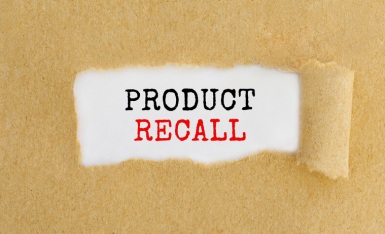
Data reveals EU "serious" food alerts up 58% since 2013
EU motor vehicle notifications up 150% since 201
The increasing number of food and vehicle product recalls around the world is leading to heightened government scrutiny of manufacturers’ ability to safeguard consumers, according to global law firm Clyde & Co.
Clyde & Co's analysis of EU data* shows significant increases in product alerts in recent years. In the EU, food alerts have risen steadily from 10 in 1995, to 519 "serious" alerts in 2013, and a record high of 818 such alerts in 2017. Alerts for motor vehicles have also seen a significant rise, up from 149 notifications in 2012, to 372 notifications in 2016**.
Speaking at a seminar in London last week, Jason McNerlin, legal director at Clyde & Co, highlighted the rising trend in recalls and what he described as an unusually high level of government interest in recall systems, in both Europe and the US. As an example, he noted last month’s formation of the Office for Product Safety and Standards in the UK.
McNerlin attributed the rise to a range of factors, including improved ability to detect food contamination, persistent issues with undeclared allergens in food, the trend for some automotive components to be used in a high number of different vehicle models, and the increasing complexity of consumer products. Some defects may become apparent only when products are used in mass numbers, and even then, may affect only a small proportion of products; pre-market sample testing may not detect every issue.
Government oversight around product safety and recall may be at its highest ever level, McNerlin said. In the UK, the Food Standards Agency and Food Standards Scotland are engaged in a major review of food withdrawal and recall processes. A key part of this review is exploring ways in which authorities might communicate with a greater number of consumers to alert them of potential issues with foodstuffs.
In the US and EU, reviews of certain aspects of consumer product recall systems have also taken place in the last few months. Recent issues with defective tumble dryers in the UK have highlighted concerns about manufacturers’ ability to carry out remedial works on a higher proportion of affected products. The government is known to be considering new ways of improving product recall communications with consumers, including the possibility of automatic registration at the point of purchase. In the US, there have also been concerns about manufacturers not giving timely notice to the authorities, upon discovering possible product defects. Several US cases have seen multi-million -dollar penalties for violations relating to product reporting and recall.
High-profile automotive recalls have recently called into question key elements of safety processes, including analysis of complaint data, and identification of trends for evidence of possible defects. Improvements to procedures are being made in the UK and the US, to help ensure that vehicle manufacturers are carrying out necessary investigations and responding effectively where required. A new Enforcement Directorate has been set up in the UK, aimed at making the recall system more effective here. As with food and consumer products, UK and US automotive authorities are also exploring ways to improve recall communications and success rates.
Jason McNerlin said: “Manufacturers and their insurers need to be aware of this rising trend for product recall events, and the impact of heightened government involvement around the world. In fact, government oversight of product recall may well be at its highest ever level. In the UK, we’ve seen the formation within the last few weeks of the Office for Product Safety and Standards. Its priorities include establishing an incident management capability to respond to national product safety issues."
“The degree of oversight of recalls, internationally and across different product sectors, is increasing. Governments may aspire to have systems that are entirely voluntary, requiring minimal involvement and expense on their part, but more resources are being allocated to make processes more effective."
"Generally, the trend is towards expecting earlier precautionary reporting and corrective action. There are demands on authorities and manufacturers alike to prove that actions have been prompt and successful. In some instances, recall completion rates remain stubbornly low. Even in the automotive sector, which tends to see higher success rates than other sectors, research suggests some large-scale recalls in the US have a completion rate of only around 50% of affected vehicles. We should expect to see continuing pressure on manufacturers and others to do more to achieve higher success rates.”
McNerlin advised insurers that their manufacturer clients should not only plan for product recalls, but also rehearse those plans to help ensure they are fully prepared to respond appropriately, based on scientific risk assessment as well as applicable product regulations.
Jason McNerlin was speaking at Clyde & Co’s London headquarters to an invited audience of 50 insurance professionals, including product recall and crisis management brokers and underwriters.
*Clyde & Co analysed the EU's RAPEX alert system, RASFF Portal, and annual reports
** Figures for 2017 are not yet finalised

